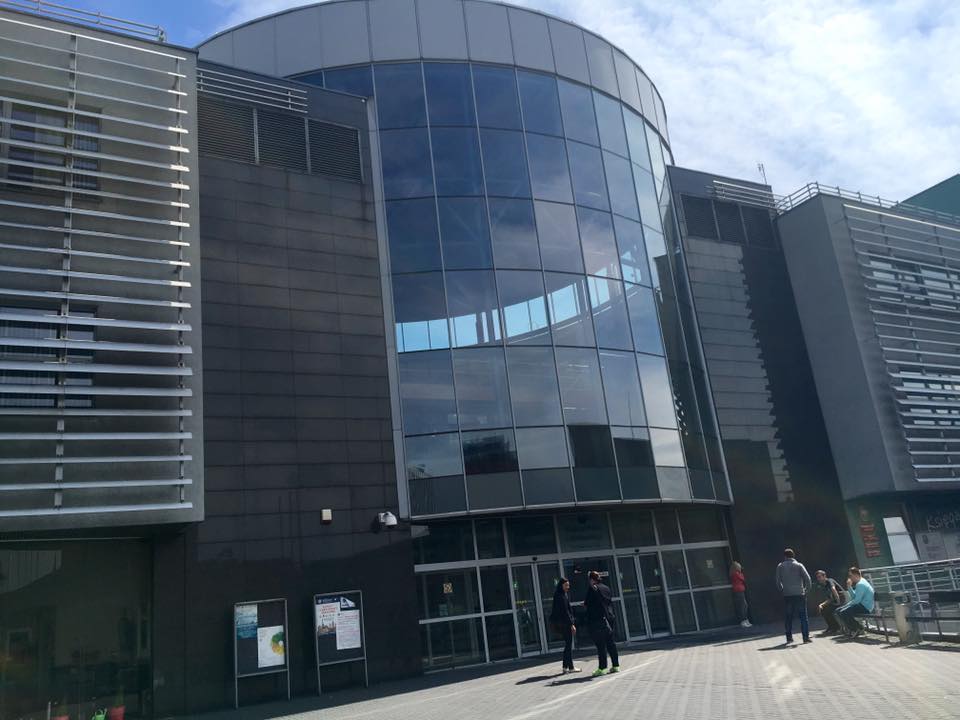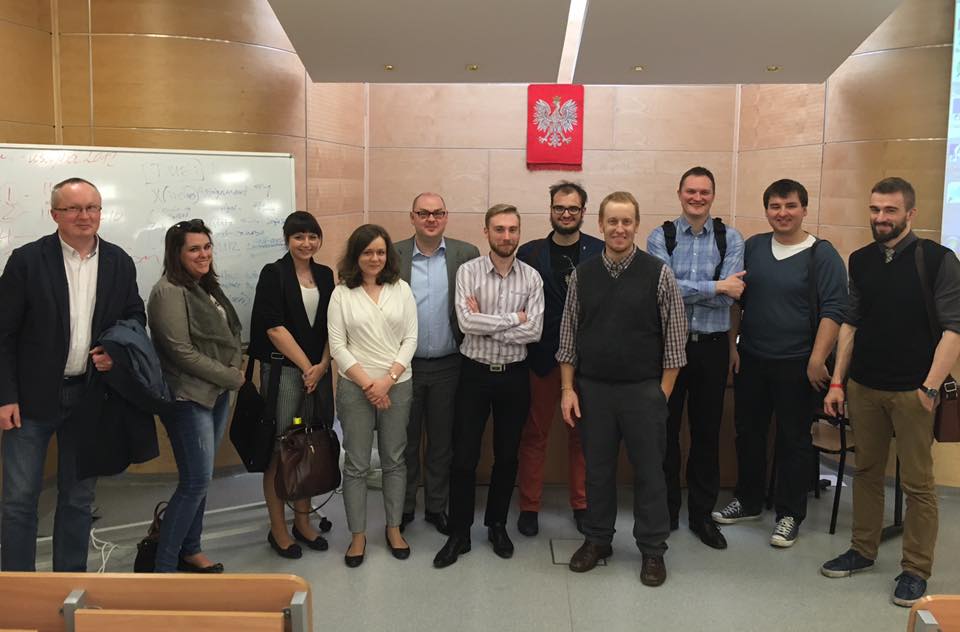Volume 41, Issue 2 (Spring 2018)
By Jeff B. Woodmansee, 2017-2018 SWALL Vice President/President-Elect
The School of U.S. Law is a new international course of the Faculty of Law and Administration of the University of Silesia. It is being organized in cooperation with the law faculties of three different universities based in the United States:
- Loyola University New Orleans College of Law
- UA Little Rock Bowen School of Law
- University of Toledo College of Law
The course is comprised of ten sessions, which take place on one weekend each month. Each weekend session is led by professors specializing in particular areas of U.S. law, delegated by the law faculty of one of the partner universities. The classes are conducted solely in English. Program description: http://www.wpia.us.edu.pl/studia/susbl
Professor Jeff B. Woodmansee, J.D., M.L.S., was one of four Bowen faculty members who participated in the inaugural edition of the School of U.S. Law program in conjunction with the University of Silesia in Katowice, Poland. He taught Specialized Legal Research in U.S. Criminal Law in 2016. Course sections had 35 enrolled students and were taught in English during live sessions. These courses covered approximately 16 hours of content over a two-day period each month.

This class was designed to equip students with the knowledge and practical skills necessary for effective legal research, with a specific focus on the legal research materials and strategies used in the practice of criminal law for students interested in becoming criminal prosecutors or defense attorneys. The course reviewed the basic concepts of research and foundational primary sources of federal criminal law, including the Constitution, statutes, case opinions, and specialized materials relevant for criminal law research. The class emphasized research methods in a variety of online formats, including modern database searching via Westlaw, Lexis Advance, Bloomberg Law, Fastcase, Google Scholar, and Justia, as well as relevant federal government websites and online sources for factual investigation.
- What are your thoughts on the School of U.S. Law?
The collaborative effort on the part of the participating faculty from Bowen and colleagues from the other law schools, partnering with the amazing team of faculty and staff from the University of Silesia, has made for a truly meaningful cultural exchange and enriching legal education program for those students who enrolled in the inaugural year of the program. Without a doubt, this course became much more than a study of U.S. criminal law research and comparative legal systems. The program brought together a diverse background of American educators along with law students and active legal practitioners from all over Poland (and other parts of Europe) to make for a truly enriching exchange of ideas, culture, and new methods of teaching and relating to others. Everyone – myself included – learned so much from this experience.
- How was your teaching experience?
The first group of students comprised of wide range of ages, personal and professional backgrounds, and previous international experiences. Collectively, these students quickly exceeded my expectations and any uncertainty I had about communicating content and making connections. Most were quite fluent English-speakers who arrived eager to learn and were very thoughtful and engaging. They came in with a surprisingly keen awareness of American popular culture and the basics of our criminal law system – at least the way it is portrayed in the media and Hollywood.
The students were interested in the substance of the class, but were equally curious about the U.S. legal education system and legal processes. As a result, each day’s sessions of structured content presentations and related class activities worked well in this format. Perhaps some of the most impactful moments arose from the several “unplanned” free-flowing class discussions that gave students an open forum and provided me with many opportunities to assess their interests and skills and adapt our approach as we moved through session material. For example, having both a practicing judge and an experienced criminal defense attorney among attendees led to several “mock trial” activities. Informal discussions about student use of Westlaw for class led to comparisons of the major databases primarily used in Poland and Europe and a student-led demonstration of their two major platforms. Students also knew a lot about the O.J. Simpson murder case because of two recent American television series which led to a lot of questions and discussion about our system. It was particularly helpful that the University and attendees were very flexible in how session hours were structured and our time was allotted over the two days, including making some minor adjustments to the schedule as we moved through the content and class activities that went longer than anticipated.

- Did you enjoy your time in Poland?
Silesia’s hosts made it a fantastic experience and I was made to feel incredibly welcome from the moment I was met at the airport. The law school’s supporting faculty and staff, particularly my international liaison Tomasz Chabryzk, went above and beyond in literally every aspect of my visit. This includes everything from airport and hotel fees to logistics and collegial and technical support on-site throughout class sessions. They also showed such great concern for my personal needs, comfort, and particular interests while visiting. One of the highlights of the experience was being taken out for dinner and drinks by Tomasz, Anna Lichosik, and other colleagues after the first day of teaching, including a trip to the top floor of the SkyBar overlooking the city. Tomasz also arranged a wonderful downtown walking tour on my final night that I will never forget. While I wish I could have planned to visit Krakow or Warsaw while in the country, Katowice was a beautiful city with an interesting blend of old and new architecture. More than buildings, the long conversations about our respective cultural perceptions and personal paths to the legal profession were so enlightening. I can honestly say that I have never been treated so well. I was so grateful to have such a thoughtful “right hand man” assisting me at every turn, particularly since this was my first trip to Europe and there so much going on over those couple of days.
- Is there anything you would like to add?
I have shared a personal email communication with Michal Pyrzowski, one of the half-dozen or so students I struck up a friendship with during my time there, who I have kept in contact with via email and social media since April. I have others, but this email from Michal, below, is illustrative of some of the good relationships started during my short stay. He indicated to me that he would be happy for any of his quotes to be included in a write-up about this program if it would be useful.
Excerpt:
“Dear Professor,
Thank you very much for those warm words. You must know, that from all of the subjects so far in this course, yours was the most valuable, practical and I have to say important for every lawyer to attend. The atmosphere you created, [and the] discussion and the content you provided for us was one-of-[a]-kind. And for that, thank you very much.
And if you ever need any assistance or reference I could help with please do not hesitate to let me know.
Best regards,
Michal Pyrzowski”
Pingback: President’s Letter | SWALL Bulletin